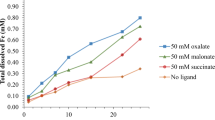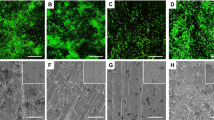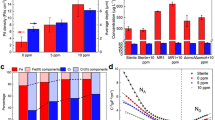Abstract
THE classical theory of anaerobic bacterial corrosion, postulated by von Wolzogen Kühr and van der Vlugt1, states that certain organisms, primarily those of the bacterial genus Desulfovibrio, remove hydrogen (electrons) that accumulate on the surface of iron (cathodic depolarization) by means of a hydrogenase, and reduce SO4−− to S−−. As a result of electron removal, iron dissolves as Fe++ ions at the anode.
This is a preview of subscription content, access via your institution
Access options
Subscribe to this journal
Receive 51 print issues and online access
$199.00 per year
only $3.90 per issue
Buy this article
- Purchase on Springer Link
- Instant access to full article PDF
Prices may be subject to local taxes which are calculated during checkout
Similar content being viewed by others
References
von Wolzogen Kühr, C. A. H., and van der Vlugt, L. S., Water, 18, 147 (1934).
Iverson, W. P., Science, 151, 986 (1966).
Roller, D., and Scott, W. R., Corros. Tech., 8, 71 (1961).
Rudakov, K. J., Zentr. Bakteriol, Parasitenk., Abt. II, 79, 229 (1929).
Tsubota, G., Soil Plant Food, 5, 10 (1959).
Author information
Authors and Affiliations
Rights and permissions
About this article
Cite this article
IVERSON, W. Corrosion of Iron and Formation of Iron Phosphide by Desulfovibrio desulfuricans. Nature 217, 1265–1267 (1968). https://doi.org/10.1038/2171265a0
Received:
Revised:
Issue Date:
DOI: https://doi.org/10.1038/2171265a0
This article is cited by
-
Analysis of cultivable aerobic bacterial community composition and screening for facultative sulfate-reducing bacteria in marine corrosive steel
Journal of Oceanology and Limnology (2019)
-
Research progress and application prospect of anaerobic biological phosphorus removal
Applied Microbiology and Biotechnology (2019)
-
Corrosive Metabolic Activity of Desulfovibrio sp. on 316L Stainless Steel
Journal of Materials Engineering and Performance (2016)
-
Lightning-induced reduction of phosphorus oxidation state
Nature Geoscience (2009)
-
Phosphine in the Lower Atmosphere of Qingdao—A Coastal Site of the Yellow Sea (China)
Water, Air, and Soil Pollution (2009)
Comments
By submitting a comment you agree to abide by our Terms and Community Guidelines. If you find something abusive or that does not comply with our terms or guidelines please flag it as inappropriate.



